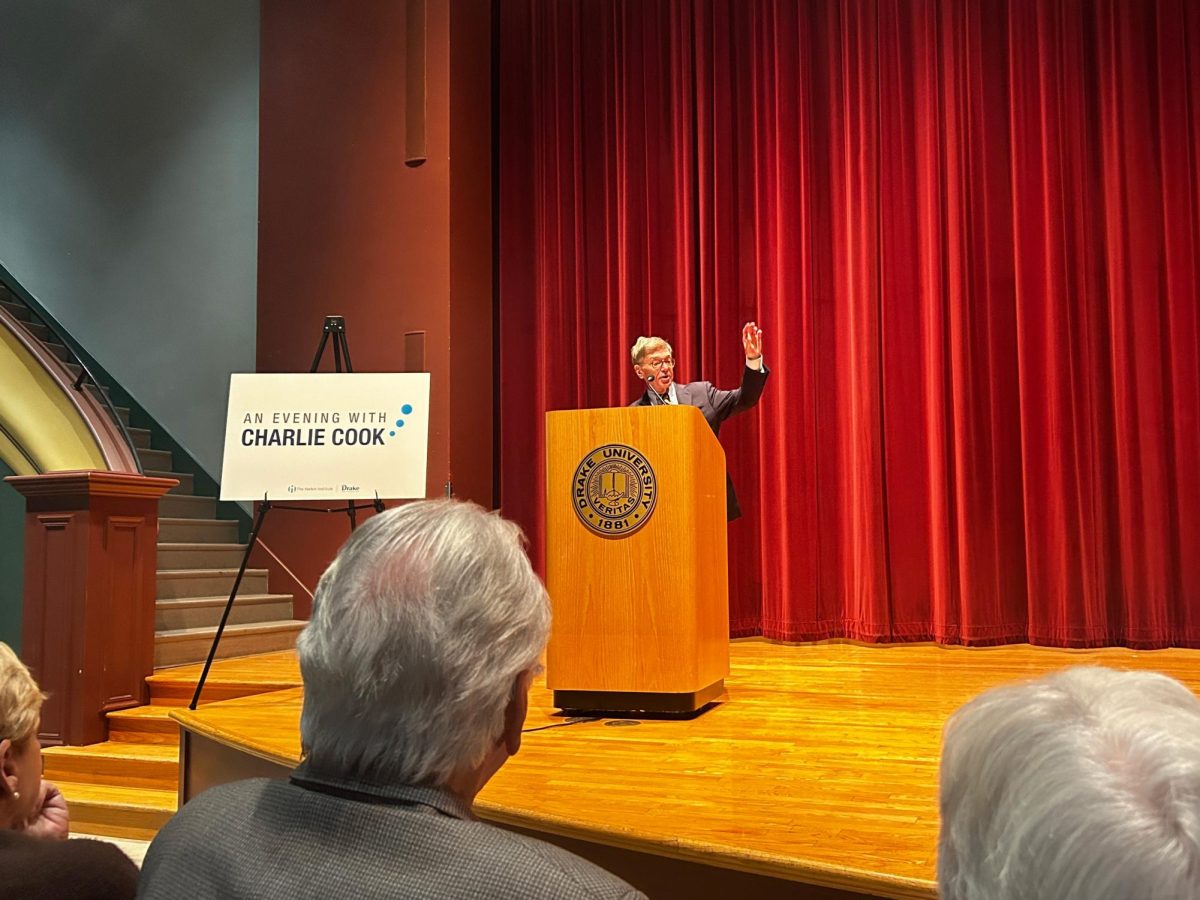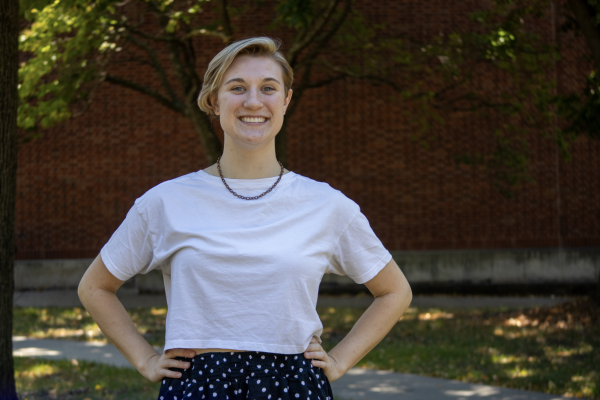Sheslow Auditorium brimmed the Monday following Election Day as more than 100 people gathered to hear from famous political analyst Charlie Cook — part of Drake’s annual “An Evening with Charlie Cook” event.
In a nearly hour-long lecture and Q&A, Cook gave his take on undecided voters’ late-stage swing towards President-elect Donald Trump, pollster Ann Selzer’s faulty reading that Vice President Kamala Harris led in Iowa and the future of the Democratic party.
“To me, it was like two different elections. It was the presidential and then everything else,” Cook said in a pre-event interview with The Times-Delphic. “In the presidential [race], there were some interesting, multifaceted things, and below the presidential level, it was a fairly boring election.”
Why polls failed to predict a Trump win
In the weeks leading up to the election, national polls told different stories regarding Americans’ presidential pick. Cook addressed this uncertainty, saying he could have “scientifically” looked at polling data and still failed to make a prediction.
“I would like to be able to tell you that I predicted this,” Cook said. “I’d be lying.”
Cook defended Selzer, whose September Des Moines Register/Mediacom Poll showed Harris leading Trump by three points in the Hawkeye State. On Election Day, Iowans preferred Trump by nearly 13 percentage points. Polling has become more complex as landline use has declined and people have become less likely to respond, he said.
“If you’re in the polling business long enough, you’re going to get some of these [miscalculations],” Cook said. “Ann is a terrific pollster, and this was hers.”
Polls demonstrated “no indications ahead of time” that Trump would sweep the 3-4% of voters who declared they were undecided, yet that appears to have happened, Cook said. He added that these voters experienced “cross pressure” from both the Trump and Harris campaigns but ultimately sided with Trump due to concerns about the economy and the border.
“A lot of them were somewhat tired of Donald Trump and didn’t really want him in their living room and on their TV sets for the next four years,” Cook said. “On the other hand, they hadn’t had a really good time the last four years and the cost of living, and some were unhappy with the border and this and that.”
Cook said some of these voters could have been upset with Biden’s “ambitious” agenda — an agenda he would have expected from a president who won a landslide victory, not a president who barely edged out his opponent.
“There was a side of me that was asking Democrats, ‘If this guy is the existential threat to the country and democracy, why are you taking risks that might make it easier for him to come back?’” Cook said.
Cook critiques both parties
In response to audience questions about how Democrats should respond to Republican victories in the presidential race, House and Senate, Cook recommended that current and future Democrats in office “walk more carefully” unless they win their seats “by a big ol’ margin” of votes.
The Democratic party also faltered by making incorrect or incomplete assumptions about its voter base, Cook claimed. For instance, abortion was “not the silver bullet that I think Democrats were counting on it being,” he said.
Cook also criticized the party for telling working-class Americans “what their priorities ought to be,” claiming that this “condescending” tone caused the party to lose the support of some working-class Americans, particularly non-college-educated men. 61% of this demographic voted for Trump, compared to 48% of their male college-educated peers.
Finally, Cook claimed that Democrats had “written off too much of this country,” including people who go to church and small town rural America.
Cook also had some advice for Republicans, however.
“This was not a huge mandate,” Cook said of Trump’s victory. “This was more rejection of the last four years rather than embracing a specific agenda or a specific person.”
Cook discussed Trump’s well-known social media antics and attention-warranting remarks, noting that “if Trump loses, it’s because of Donald Trump.” However, he also recognized that Kamala failed to shake off the baggage of the Biden administration.
“The cost of living and the border might well have sunk any Democratic nominee,” Cook said.
Lecture a ‘valuable’ event
Drake has hosted the annual “An Evening with Charlie Cook” since 2015 through the Harkin Institute. Sen. Tom Harkin and Ruth Harkin met Cook when Sen. Harkin served in Congress, and when the Harkins announced the creation of The Harkin Institute, Cook became one of the first board members. He started his annual lecture shortly after.
Consistently, most of the event’s attendees are members of the surrounding community — Cook estimated 90% — rather than students. Drake senior Sophie Ernst said she was surprised by the lack of students at the event and wishes it was marketed more thoroughly.
“It was something that was valuable to me as a student. It’s not like it was just valuable to the older people who were there,” Ernst said.
Ernst, who works at the Drake Diner, met Cook when he and Iowa Auditor Rob Sand stopped at her workplace for lunch. After a brief conversation with Cook at the diner, she decided to attend his Monday night lecture.
“He talks smart, but he doesn’t talk like he’s smarter than you. I feel like I’m an equal in conversation,” Ernst said.
During their brief conversation, Cook also impressed Ernst on the importance of setting boundaries with political news consumption.
“Charlie Cook told me that sometimes it’s better for my mental health to not know everything about politics or know all the specifics,” Ernst said. “Sometimes it’s good to put up a boundary.”








